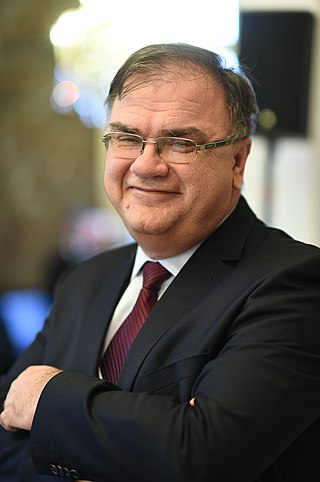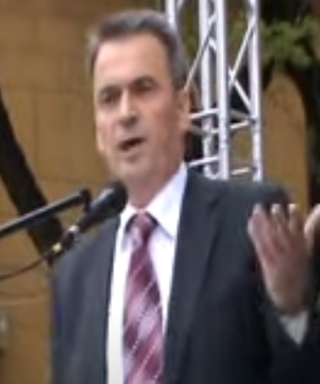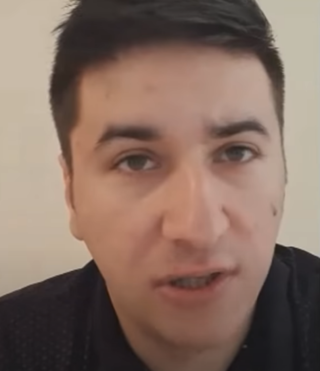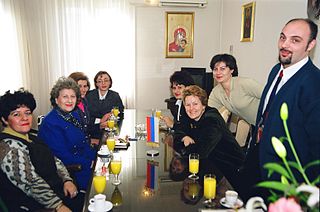The Politics of Bosnia and Herzegovina takes place in a framework of a parliamentary representative democracy, whereby executive power is exercised by the Council of Ministers of Bosnia and Herzegovina. Legislative power is vested in both the Council of Ministers and the Parliamentary Assembly of Bosnia and Herzegovina. Members of the Parliamentary Assembly are chosen according to a proportional representation system.

Biljana Plavšić is a former Bosnian Serb politician and university professor who served as President of Republika Srpska and was later convicted of crimes against humanity for her role in the Bosnian War.

Mladen Ivanić is a Bosnian Serb politician who served as the 6th Serb Member of the Presidency of Bosnia and Herzegovina from 17 November 2014 until 20 November 2018. He is the founder, member and former president of the Party of Democratic Progress.

The Party of Democratic Progress is a centre to centre-right Serb political party in Bosnia and Herzegovina founded on 26 September 1999. It is the third-largest party in the Republika Srpska entity.
The Serb National Alliance or Serbian People's Alliance of Republika Srpska was a Serb political party in Bosnia and Herzegovina, active in the Republika Srpska entity.

The Alliance of Independent Social Democrats is a Serb political party in Bosnia and Herzegovina. Founded in 1996, it is the governing party in Republika Srpska, with its leader, Milorad Dodik, serving as the current president of Republika Srpska. The party's vice-president, Željka Cvijanović, is the current member of the Presidency of Bosnia and Herzegovina, while SNSD member Radovan Višković is the current prime minister of Republika Srpska.

Zoran Žižić was a Yugoslav and Montenegrin politician. He served as Deputy Prime Minister of Montenegro in the first two Đukanović cabinets from 1991 to 1996, and was the first Prime Minister of the Federal Republic of Yugoslavia following the overthrow of Slobodan Milošević in 2000.
This article is about the politics of the Republika Srpska, one of the two entities that together comprise the state of Bosnia and Herzegovina, the other being the Federation of Bosnia and Herzegovina.

The presidential election of 2007 in the Republika Srpska entity of Bosnia and Herzegovina was announced after the premature death of President Milan Jelić on 30 September 2007 and was held on 9 December 2007. Until the election took place, Igor Radojičić, also from the ruling Alliance of Independent Social Democrats, was acting president. The election had to be called within fifteen days of Jelić's death; it was called on 11 October 2007, with candidates to be nominated by 16 October 2007.
Nikola Poplašen is a former Bosnian Serb politician. He was the president of Republika Srpska from late 1998 to 1999. He was removed by the High Representative of Bosnia and Herzegovina, Carlos Westendorp, on 5 March 1999. The removal was enforced on 2 September 1999.

Željka Cvijanović is a Bosnian Serb politician serving as the 8th and current Serb member of the Presidency of Bosnia and Herzegovina, the collective federal head of state. She previously served as the 9th president of Republika Srpska from 2018 to 2022.
Miroslav Markićević is a politician in Serbia. He served in the National Assembly of Serbia from 2001 to 2020 as a member of New Serbia.

Milorad Mirčić is a Serbian politician. He is a prominent figure in the far-right Serbian Radical Party and has served several terms as an elected official at the local, provincial, and republic levels. Mirčić was the mayor of Novi Sad from 1993 to 1994 and was minister of the Serb diaspora in the Serbian government from 1998 to 2000. He is now a member of the Novi Sad city assembly.

Draško Stanivuković is a Bosnian Serb politician serving as mayor of Banja Luka since December 2020. He is a member of the Party of Democratic Progress.

Vladislav Dajković is a Montenegrin Serb politician serving as a member of the City Assembly of Podgorica since 12 April 2023. He was one of the founders and former secretary general of the True Montenegro, a right-wing populist pro-Serbian political party in Montenegro, which he left in 2019, after which he founded another right-wing party, Free Montenegro.

Mićo Mićić was a Bosnian Serb politician, mayor of Bijeljina for 16 years from 2004 until 2020 and a Republika Srpska entity minister.
Đorđe Đukić is a former politician in Serbia. He was the president of the executive council of Vojvodina from 2000 to 2004. He also served at different times in the Assembly of the Federal Republic of Yugoslavia, the National Assembly of Serbia, and the Assembly of Serbia and Montenegro, as well as being the mayor of Žabalj from 1996 to 2000. Originally a member of the Democratic Party, he joined the Liberal Democratic Party following a split in 2005 and later affiliated with the United Regions of Serbia.

General elections were held for the first time in Republika Srpska on 14 September 1996. They were the first direct elections in Republika Srpska since its proclamation in 1992 and Bosnian War that ended in 1995. Previous National Assembly was created in 1991 and was made up of Serb MPs that were elected to the Socialist Republic of Bosnia and Herzegovina Parliament following 1990 Bosnian general election. Presidential election were held simultaneously because incumbent President Radovan Karadžić resigned in 1996 due to international pressure.
General elections were held in Republika Srpska on 11 November 2000 alongside nationwide parliamentary elections. They were the third general elections in Republika Srpska since the end of Bosnian War.

The 1997–1998 crisis in Republika Srpska was caused by a political conflict between the reformist faction led by the President of Republika Srpska, Biljana Plavšić, and the hardline nationalist one led by former President Radovan Karadžić and his associates from the governing Serb Democratic Party. The crisis was resolved by an early election and a victory of the opposition and Plavšić.















